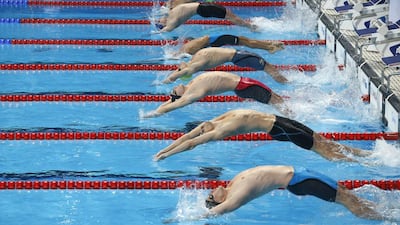KAZAN, RUSSIA // The 2016 Rio de Janeiro Olympic Games will force swimming’s elite to adopt some nocturnal habits as preparations are stepped up in the coming months in the race for golds.
The world championships finished on Sunday as the United States again ended top of the swimming table in Kazan with 23 medals followed by Australia (16), China (13) and Britain (nine).
But for coaches and swimmers alike, Kazan is already forgotten – it’s all about Rio from now on – and lots of late nights.
Traditionally, the swimming section of the Olympics involves morning heats and early evening finals.
But to capitalise on the US television market, the Rio finals are scheduled to start at 2200 local time with the heats beginning at 1300.
It means many medals will be decided around midnight.
Any newly-crowned champion can expect to see their bed in the early hours of the next day after the medal ceremony, media interviews, doping control and bus to the athletes village.
For the swimmers, the unusual schedule is just part of their job description.
This is not the first time the Olympic schedule has been changed – the finals of the 2008 Bejing games were held in the morning with evening heats.
“You walk out for a final and the timing is the last thing on your mind,” said Australia’s Mitchell Larkin, who won 100m and 200m backstroke gold in Kazan.
“It will be late in Rio, but it’s part and parcel of being an athlete. All we can do is prepare.”
Sweden and Germany held training camps last January in Rio for their elite swimmers to get used to the Brazilian metropolis.
Each country has a plan for Rio, but Swimming Australia is holding a five-day training camp at Canberra’s Australian Institute of Sport next month to give their swimmers a taste of what to expect.
It includes two days of competition with early afternoon heats and late night finals, plus everything from doping controls to mock media interviews.
“Everything from now on will be about getting the athletes as ready as possible for Rio, both inside and outside the pool,” said Australia’s media manager Ian Hanson.
“The Olympics has thrown a curve ball, but everyone is in the same boat.”
A year is a long time in sport and the list of Rio medal winners is likely to look very different to those in Kazan.
Big names, like US superstar Michael Phelps, France’s Yannick Agnel and Australia’s James Magnussen, will return to fight for Rio medals.
Phelps, 30, was suspended for Kazan after last year’s drink-driving conviction, but he would have won two world golds in Kazan, based on his times at the US Championships on Saturday.
Phelps’ world-best times for the 100 and 200m butterfly in San Antonio eclipsed those in the corresponding Kazan finals.
Katie Ledecky, the stand-out performer, left Russia with five gold medals having lowered two of her three world records.
The 18-year-old is the first swimmer in history to win the 200, 400, 800 and 1500m freestyle golds at a worlds and earned a relay gold.
She describes Kazan as a “great stepping stone towards the US trials” as she keeps “slowly chipping away” at her goals.
Some 44 years after Shane Gould of Australia won Munich Olympic medals in the women’s 100, 200, 400 and 800m freestyle, Ledecky looks set to rival those historic results in Rio.
Adam Peaty dazzled on his worlds’ debut by completing the 50 and 100m breaststroke double, breaking the sprint record twice in the process, and picked up a third gold and world record for Britain in the mixed relay
“I never thought I’d walk away from my first championships with three gold medals, but I’ll take nothing for granted next year,” said the 20-year-old.
“I want to be ruthless with my start and try to get them perfect every time. I want to nail them to get faster times.”
But British coach Bill Furniss’s tough appraisal of Kazan could be aimed at any world medallist dreaming of gold in Rio.
“It’s a platform, and no more than that, before Rio,” he said.
“Make no mistake, this is not the Olympics and that is what I will be telling our swimmers in the wrap-up meeting.
“Expect the Olympics to be between ten and 15 percent harder, which means we have to be 15 percent better at handling the pressure.”
sports@thenational.ae
Follow us on Twitter at NatSportUAE

